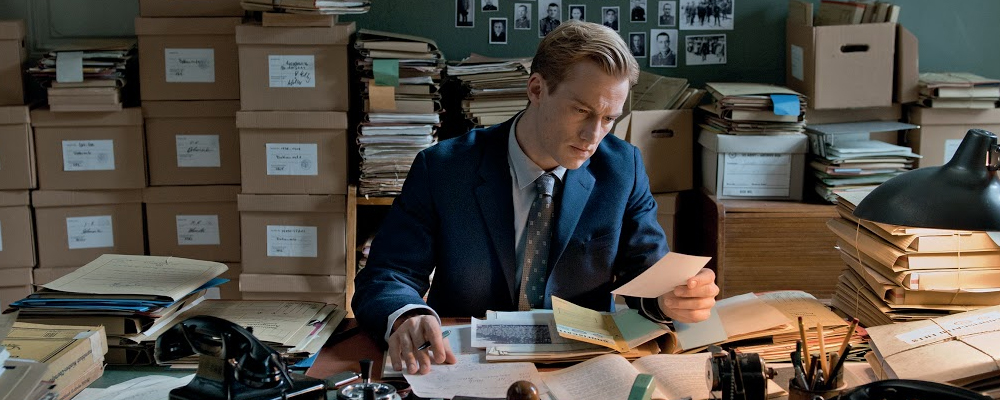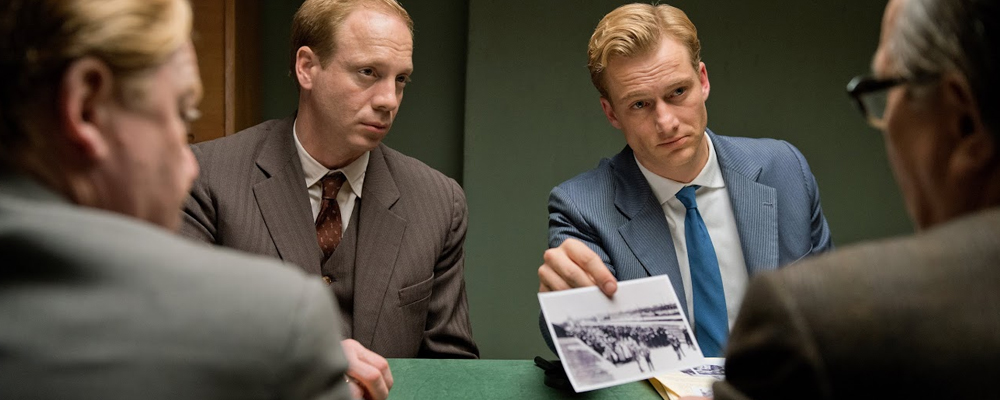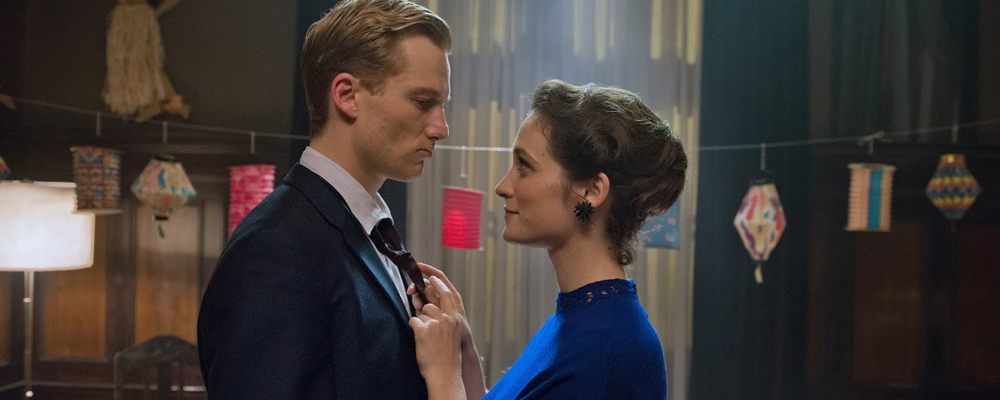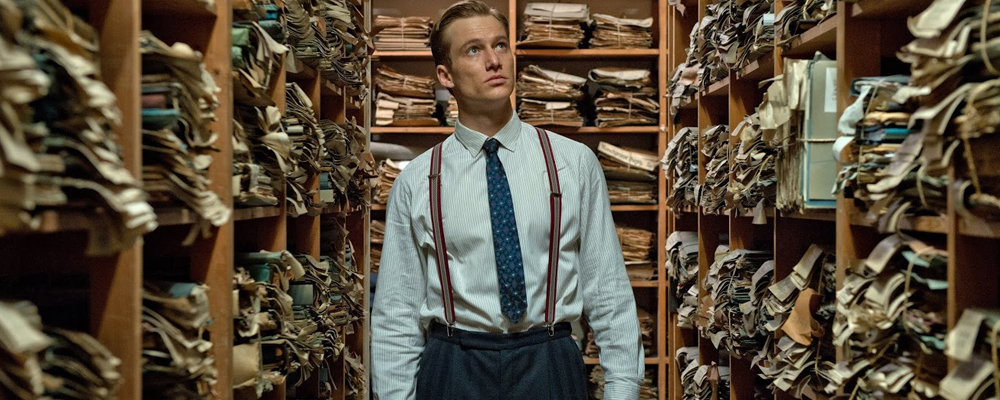Giulio Ricciarelli and Alexander Fehling Tell a Story of Post WWII German Catharsis in ‘Labyrinth of Lies’
Brendan Reynolds
Representing Germany as a Best Foreign Language Film nominee at the upcoming 88th Academy Awards, the story of “Labyrinth of Lies” takes place in 1958 Frankfurt where a young public prosecutor Johann Radmann (Alexander Fehling) spearheads a trial against several former members of the Nazi SS for the heinous crimes they committed at the Auschwitz concentration camps during the Second World War. Although the filmmakers do take some artistic liberties in the dramatic portrayal of historical events, the film is closely based on the Frankfurt Auschwitz trials initiated in the early 1960s by Prosecutor General of the State Fritz Bauer, which eventually put hundreds of SS personnel on trial for their horrific war crimes. The large public spectacle around the trials broke the prolonged fog of denial the German people and state had widely fell under while recovering from the aftermath of the war. The efforts made and depicted in the film by the trial’s prosecutors essentially provided a national public catharsis for the German people in forcing them to confront the terrible truths behind the atrocities perpetrated on their homeland.
Director Giulio Ricciarelli and lead actor Alexander Fehling recently sat down with Entertainment Voice to discuss the inspiration behind and exhaustive research involved in making their bold film. Fehling can also been seen in the upcoming season of Showtime’s hit political thriller series “Homeland.”
To Giulio: What inspired you to make this film?
GR – Basically, that I didn’t know the story. I was looking for a theme for a feature film, and I was talking to Elisabeth Bartel, who I eventually wrote the screenplay with, and she had just read an article about it. So I was confronted with this incredible story and I couldn’t believe it. I grew up in the German school system and I realized I had no idea about the atmosphere in Germany in the 50s and the 60s, so as a filmmaker I realized that this story was an absolute treasure. This is a story that was not known and has to be told, and that is such a rare thing in filmmaking. So that is when we decided to go all in and write the script.
The central character in the film, Prosecutor Johann Rodman, was actually based on three different men. Can you talk a bit about their stories and how that all came together?
GR – We decided to take poetic license on one thing, which is the emotional journey of the lead character, which is also the backbone of the film. So we decided to give him a different name and make it clear that this is not a historical fact. And of course, we were very much influenced by the original prosecutors, for instance Joachim Kugler, whom we worked very closely with while writing the films. Sadly, he’s passed away now. Kugler was so disgusted with the German justice system that he quit his job and became a defense attorney and actually defended war criminals. So this is the big movement we have with the character of Johann, that he becomes disgusted and quits. But the emotional journey he goes through is an invention, so he’s a composite of these three men.
To Alexander: What attracted you to the project?
AF – The story, it’s always the story. When I read the script for the first time, I immediately gave my respect to Giulio, because it was already so well written. And of course, the arc of the character is always very important for an actor, because he is going through so many different stages of emotion. But it was basically the story and the ambiguity of the character.
To Giulio: Did you have a lot of interaction with the prosecutors the story is based on during the researching/writing process?
GR – Yeah, we talked to two of them; Gerhard Wiese and Joachim Kugler were both very involved. It’s like a pendulum, you do a lot of research and you read a lot, then you clear your head and you start writing the film. I was always very clear, that we wanted to make a feature film, not a quasi-documentary that was just a stating of facts. We wanted the audience to have an emotional experience, so you kind of free yourself through the writing, then you go back to the research. And a lot of things were born from that. The idea was to get history into the picture and to get emotions into the history. So that process was quite complex, but also quite rewarding.
To Alexander: Can you talk a little bit about how you prepared for the role?
AF – I was reading a lot in the beginning, about the societal situation Germany was in at that time and a lot about the trials. I figured out who Fritz Bauer was and read his biography. And I had the good fortune to speak to one of the prosecutors who worked very close to Fritz Bauer, his name was Gerhard Wiese. I asked him a lot of stupid and banal questions. But that was just the homework, because in the end you can’t play knowledge, and maybe you can’t write knowledge either, at least in this case because the material was pretty dry. The portrayal has to be very vivid in the end, and the material has to be vital. So then, you deal with the script and you learn about the relationships in the story.
GR – And I must say a lot of the collaboration and your work on the film was not visible, and there was a lot of discussion between us about what worked and what didn’t work for Alexander as an actor.
AF – We went through the script many times, just talking about the scenes. Also, I was lucky enough to speak with historians about the trial, and there was one thing that really interesting. Back then, it was not allowed to film the trials, so they recorded them. And so there was more than 400 hours of audio recordings, with everything, the verdict, testimonies, everything. Just the verdict took two or three days. These recording had been in the Fritz Bauer institute, so no one was really allowed to hear them, but then they published them on their website, and so I began to listen to them every morning and every night when I got back from work.
That’s interesting because the character was based on three different people, so you couldn’t just emulate the speech pattern or personality traits of one individual person.
AF – Absolutely not, but as an actor you always try to find a vivid impression of someone that is actually very foreign to you. So you’re searching for some kind of needle in the haystack, in order to get into the story. So this was really helpful for me, you know hearing something is totally different from seeing or watching something. You know these trials went on for several years, so when I talked to these men and asked them what it was like for them emotionally, they told me that they just went to work. You know you get used to almost anything after a while, no matter how terrible the subject matter. So I think listening to these tapes every day made it feel like I was just going to work as well, and that really allowed me to see things from the prosecutors’ perspectives.
The film explores very important, albeit very dark subject matter; can either of you share about your emotional state of mind, or any personal thoughts or feelings you had while researching and preparing for the film?
GR – When I was eight, someone brought a pack of pictures from the camp to school. And I was destroyed because I couldn’t get the image of this world and the world I was actually living in to match. Basically, even with all the research I did, there’s still a basic non-comprehension of what happened there. That humans did this to other human beings, it’s hard to understand and accept. And this is a major idea we were trying to get across in the film. But that was my strongest personal connection to it.
AF – The strongest personal impression that I had, which I recall, is the very first movie I did, when I was 25 or something. It was about a young man who’s doing his civil service in Auschwitz, and he’s taking care of an old Polish man who survived Auschwitz. So we shot it there, not in the camp because it’s not allowed, but in Auschwitz, which is actually a very nice little city of about 60 thousand people. There’s a little river and the sun shines. I spent I think two months there, ten years ago almost, and for me it’s the same, you see all these numbers and the barracks, and you cannot believe what it was. I remember after one month, I was sitting at a bus station out in the middle of nowhere, without seeing any dead people or thinking about these facts, I was just sitting there and it all just hit me. I remember that very vividly, because I never felt so close to this terrible catastrophe. So I think you need to spend the time there. Just going to visit as a young kid, there’s no way for it to sink in with everything else going on in a kid’s head, and the expectation of absorbing it all just creates more distance. So at that bus station in Auschwitz, no one was expecting anything from me, not even myself, and I was truly shocked about what I felt.
GR – And that’s actually part of the film. The journalist says to him, what do you see? And Johann says, Auschwitz. And the journalist says, no you see grass, you see a barrack, you see a fence, but what Auschwitz actually is, is the stories of what actually happened there. Because I had the same feeling when I was in the camp, and I only got emotional when I saw something that connected me to the story in the film. That’s what we were trying to do, to give a name, and a picture, and a story to the people who were actually there. That’s the power of film, how it can make a common story personal to everyone.
Which scenes in the film were the most difficult to make and, which were your favorites to shoot?
GR – I’d always make a joke with my assistant, because everyday on this shoot was so hard, I’d say today’s another easy day. There were scenes where Alexander and the crew made it much easier on me to get something really special to come together. But there were no easy scenes in this movie.
To Giulio: Are you interested in making a film in the U.S.?
GR – I am, and I am very interested in making a film in the English language actually, because when you have something in English, the whole world is your audience. There are a lot of great local films in Germany, but it is very hard to get them to a global audience.
AF – Which is really unfair!
GR – You know there was a vote in the American congress in the early days to make German the official language of the U.S. and it was nearly voted in. So the whole history of the world of the past half century or so would have been different if America would have spoke German. So there is a wish to shoot in English, even if it’s an international production. It really makes a difference.
To Alexander: You’re playing a prominently featured character on the upcoming season of the popular Showtime series Homeland; can you talk a little bit about your character and what fans can get excited about in this new season?
AF – I can’t reveal too much, but I play a character called Jonas Happich, he’s the man of the Carrie Mathison character (Claire Danes), and they’ve been together for two years now; there’s been a time jump between seasons. He works as a lawyer for a German philanthropist, and she’s his security chief. But she lives a very different kind of life than Jonas, so everything will get very messed up in like 30 minutes.
“Labyrinth of Lies” sneaks into select theaters Sept. 30.




